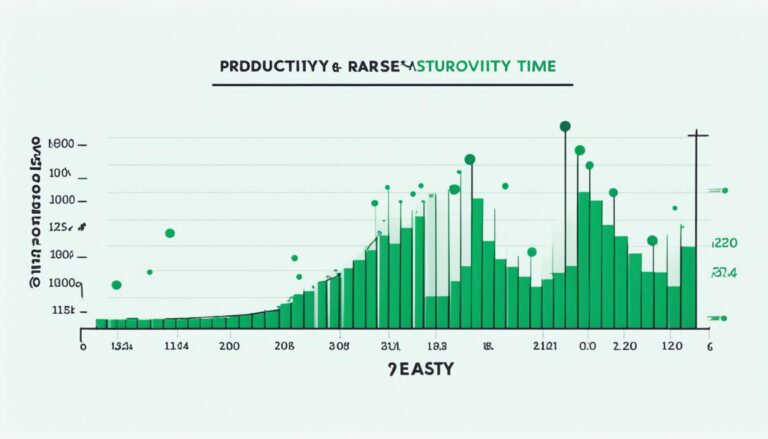Boost Your Performance: Overcome Reduced Productivity

Have you ever found yourself struggling to stay focused at work? Feeling like your productivity levels are constantly decreasing, hindering your performance? It’s time to address the issue and get back on track. Understanding the impact of reduced productivity and how to overcome it is essential for achieving your goals and maximizing your success.
Reduced productivity can have a significant impact on your work performance and overall success. It affects your ability to meet deadlines, deliver quality work, and achieve your targets. But what exactly is work performance, and why is it crucial? Is it solely based on the number of tasks completed, or is there more to it?
In this article, we will delve into the world of productivity and explore effective strategies that can help you overcome reduced productivity and boost your performance. From setting clear goals to improving time management and minimizing distractions, we will uncover the secrets to maximizing your results at work.
Key Takeaways:
- Understanding the impact of reduced productivity on work performance
- The importance of setting clear and achievable goals
- Strategies to limit distractions and improve time management
- How to prioritize tasks and optimize workflow
- The role of skill development in boosting performance
Ways to Improve Performance at Work
To enhance your performance at work and boost output, there are various strategies you can implement. Here are some effective techniques:
1. Limit Distractions
Minimize distractions to improve efficiency. Turn off notifications and schedule dedicated focus blocks to stay focused and accomplish more.
2. Set Clear and Achievable Goals
Setting clear and achievable goals allows for better task management and motivation. Break down larger goals into smaller, actionable steps to enhance performance.
3. Avoid Multitasking and Improve Time Management
Multitasking can decrease efficiency and hinder performance. Focus on one task at a time, utilizing effective time management techniques, such as prioritizing and scheduling, to enhance productivity.
4. Prioritize Important Tasks and Delegate
To streamline operations and improve performance, prioritize important tasks. Delegate tasks when necessary to optimize workflow and ensure efficient completion of projects.
5. Maintain a Healthy Work-Life Balance and Take Short Breaks
Burnout can negatively impact performance. Maintaining a healthy work-life balance and taking short breaks throughout the day can prevent burnout, increase energy levels, and improve overall productivity.

| Technique | Benefits |
|---|---|
| Limiting distractions | Improved focus and productivity |
| Setting clear goals | Better task management and motivation |
| Avoiding multitasking | Enhanced efficiency and concentration |
| Prioritizing tasks and delegating | Streamlined operations and optimized workflow |
| Maintaining work-life balance | Prevention of burnout and increased productivity |
Factors that Impact Productivity
Productivity in the workplace can be influenced by several factors that either decrease inefficiency or streamline operations. Understanding these factors can help you identify areas for improvement and take proactive steps to enhance productivity. Let’s explore some key elements that can have a significant impact on your work performance.
1. Time Management and Organization
Poor time management and lack of organization can greatly decrease efficiency in the workplace. Without effective planning and prioritization, tasks may take longer to complete, deadlines might be missed, and valuable time can be wasted. To combat inefficiency, it is essential to develop strong time management skills and implement effective organizational strategies. By establishing a structured approach to your work, you can stay on track, meet deadlines, and accomplish tasks more efficiently.
2. Rest and Relaxation
Mental fatigue can significantly affect concentration and productivity. Taking regular breaks and ensuring adequate rest and relaxation can help combat this fatigue and improve overall focus. By incorporating short breaks into your work routine, you can recharge your mind, increase mental clarity, and sustain productivity throughout the day. Remember, your brain needs moments of rejuvenation to perform optimally.
3. Setting Deadlines and Task Prioritization
Open-ended tasks can impede progress and lead to decreased productivity. By setting personal deadlines and clearly prioritizing tasks, you can create a sense of urgency and maintain a steady workflow. Prioritizing tasks allows you to focus on the most important and time-sensitive activities, ensuring that crucial deadlines are met and progress is made.
4. Saying No to Unimportant Meetings
Unnecessary or unproductive meetings can consume valuable time and hinder productivity. It is crucial to evaluate the relevance and importance of each meeting invitation, and politely decline those that do not contribute to your goals or require your input. By prioritizing your time and being selective with the meetings you attend, you can avoid unnecessary interruptions and maintain focus on important tasks.
5. Avoiding Multitasking
Contrary to popular belief, multitasking can actually decrease efficiency and productivity. The human brain is not designed to handle multiple tasks simultaneously, leading to decreased focus and quality of work. To streamline operations and enhance productivity, it is recommended to focus on one task at a time. By dedicating your full attention to each task, you can complete them more efficiently and to a higher standard.
6. Overcoming Perfectionism and Being Proactive
Perfectionism can hinder productivity by causing unnecessary delays and creating an unrealistic expectation of flawless outcomes. Overcoming perfectionism involves accepting that achieving perfection is often unattainable and can impede progress. Instead, focus on being proactive and taking action. By embracing a mindset that values progress over perfection, you can increase efficiency and accomplish more.
7. Muting Notifications and Workflow Optimization
Constant notifications and interruptions can disrupt workflow and lead to decreased productivity. Muting notifications from non-essential apps and devices can help you stay focused and minimize distractions. Additionally, optimizing workflows and processes can further streamline operations, allowing for smoother task completion and increased productivity.
By being mindful of these factors and taking proactive steps to address them, you can decrease inefficiency and create a more streamlined work environment. Remember, a focus on productivity can lead to greater effectiveness and ultimately help you maximize your results.

Strategies to Improve Job Performance
To increase effectiveness and maximize results in your job performance, consider implementing the following strategies:
1. Develop Strong Organization and Time Management Skills
Good organization and efficient time management are crucial for enhancing productivity. Prioritize tasks, create to-do lists, and use productivity tools to stay organized and focused.
2. Set Goals and Personal Benchmarks
Setting clear goals provides motivation and direction. Break down larger goals into smaller, achievable milestones to track progress and maintain momentum.
3. Perform Self-Assessments
Regularly assess your strengths and weaknesses to identify areas for improvement. Focus on developing skills or seeking additional training to enhance performance in weak areas.
4. Foster a Healthy Work-Life Balance
Balance your professional and personal life to avoid burnout and maintain mental and physical well-being. Take breaks, engage in hobbies, and prioritize self-care.
5. Ensure Clear Communication
Efficient communication is essential for productivity. Practice active listening, ask for clarification when needed, and avoid unnecessary conversations or gossip that can waste time and energy.
6. Arrive Early and Be Prepared
Starting the day early and being prepared for meetings or tasks can give you a head start, increase focus, and reduce stress. Arrive early and use the extra time to plan and prioritize.
7. Create a Schedule with Breaks
Optimize productivity by scheduling breaks throughout the day. Short breaks can refresh your mind, enhance creativity, and prevent burnout.
8. Prioritize Important Tasks
Identify the most critical tasks and tackle them first. By focusing on high-priority items, you can prevent distractions and ensure that important work gets completed.
9. Guard Your Time
Protect your time by setting boundaries and saying no to non-essential tasks or commitments. Learn to prioritize and delegate tasks when necessary to maximize efficiency.
10. Continually Learn and Grow
Stay updated with industry trends, technologies, and best practices. Continual learning expands your knowledge and enables you to bring fresh ideas and approaches to your work.
11. Cut Out Distractions and Interruptions
Avoid distractions such as excessive email checking, social media scrolling, or unrelated tasks. Minimize interruptions and create a focused work environment to maximize productivity.
By implementing these strategies, you can increase your effectiveness, maximize results, and achieve peak performance in your job.
| Strategy | Benefits |
|---|---|
| Strong Organization and Time Management Skills | Increased productivity, reduced stress, improved task completion |
| Setting Goals and Personal Benchmarks | Enhanced motivation, clear direction, measurable progress |
| Performing Self-Assessments | Targeted improvement, better resource allocation, professional growth |
| Fostering a Healthy Work-Life Balance | Prevention of burnout, improved well-being, increased job satisfaction |
| Ensuring Clear Communication | Efficient workflow, reduced misunderstandings, stronger relationships |
| Arriving Early and Being Prepared | Enhanced focus, reduced stress, improved time management |
| Creating a Schedule with Breaks | Increased energy levels, improved creativity, better overall performance |
| Prioritizing Important Tasks | Effective task management, goal achievement, optimized productivity |
| Guarding Your Time | Reduced distractions, improved efficiency, better work-life balance |
| Continually Learning and Growing | Adaptability, innovation, professional development |
| Cutting Out Distractions and Interruptions | Increased focus, improved concentration, higher quality work |

Conclusion
Optimizing your workflow and increasing effectiveness is essential for maximizing your results in job performance. By implementing key strategies such as setting clear goals, limiting distractions, and prioritizing tasks, you can unlock your full potential and overcome reduced productivity.
It is important to foster a healthy work-life balance, ensuring that you have time for both work and personal well-being. Clear communication and avoiding idle chat, drama, and gossip can prevent wasted time and maintain focus on important tasks. By arriving early, being prepared, and taking well-deserved breaks, you can recharge and maintain productivity throughout the day.
Continual learning and cutting out distractions are key elements to increase your effectiveness and achieve success in job performance. Embrace opportunities for growth, such as skill development and staying up-to-date with industry trends. By eliminating unnecessary interruptions and maintaining a streamlined workflow, you can maximize your results and significantly enhance your work performance.
FAQ
What is the impact of reduced productivity on work performance?
Reduced productivity can have a significant impact on work performance and overall success. It can lead to decreased speed, quality, and efficiency, affecting the overall output and effectiveness of tasks.
How can I improve my performance at work?
There are various strategies you can implement to improve your performance at work. Some of these include limiting distractions, setting clear and achievable goals, improving time management, prioritizing tasks, and delegating when necessary.
What factors can affect productivity in the workplace?
Several factors can affect productivity in the workplace. These include poor time management, lack of organization, mental fatigue, open-ended tasks, unimportant meetings, multitasking, perfectionism, and inefficient workflows and processes.
What strategies can I use to improve my job performance?
To improve job performance, you can focus on strategies such as developing organization and time management skills, setting goals, performing self-assessments, volunteering for challenging projects, fostering a healthy work-life balance, communicating effectively, arriving early and prepared, prioritizing tasks, guarding your time, and continually learning.
How can I maximize my results and achieve success in job performance?
To maximize results and achieve success in job performance, you can overcome reduced productivity by setting clear goals, limiting distractions, prioritizing tasks, fostering a healthy work-life balance, communicating clearly, arriving early and prepared, taking breaks, cutting out distractions, and continually learning.






